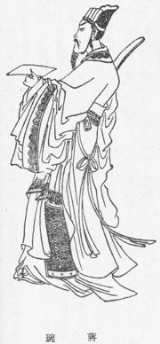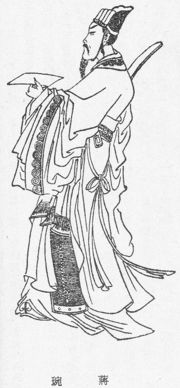
Jiang Wan
Encyclopedia

Chinese style name
A Chinese style name, sometimes also known as a courtesy name , is a given name to be used later in life. After 20 years of age, the zì is assigned in place of one's given name as a symbol of adulthood and respect...
Gongyan (公琰), was an official of Shu Han
Shu Han
Shu Han was one of the three states competing for control of China during the Three Kingdoms period, after the fall of the Han Dynasty. The state was based on areas around Sichuan, which was then known as Shu...
during the Three Kingdoms
Three Kingdoms
The Three Kingdoms period was a period in Chinese history, part of an era of disunity called the "Six Dynasties" following immediately the loss of de facto power of the Han Dynasty rulers. In a strict academic sense it refers to the period between the foundation of the state of Wei in 220 and the...
era of Chinese history
History of China
Chinese civilization originated in various regional centers along both the Yellow River and the Yangtze River valleys in the Neolithic era, but the Yellow River is said to be the Cradle of Chinese Civilization. With thousands of years of continuous history, China is one of the world's oldest...
. After Zhuge Liang
Zhuge Liang
Zhuge Liang was a chancellor of the state of Shu Han during the Three Kingdoms period of Chinese history. He is often recognised as the greatest and most accomplished strategist of his era....
's death, he succeeded Zhuge as the regent for the Shu emperor, Liu Shan
Liu Shan
Liu Shan, , was the second and last emperor of the state of Shu Han during the Three Kingdoms era of Chinese history. As he ascended the throne at the young age of 16, Liu Shan was entrusted to the care of the Chancellor Zhuge Liang and Imperial Secretariat Li Yan...
.
Early career
Jiang Wan was from Lingling Commandery (零陵; in present-day northwestern HunanHunan
' is a province of South-Central China, located to the south of the middle reaches of the Yangtze River and south of Lake Dongting...
), and both he and his brother-in-law Liu Min (劉敏) were known for their intelligence when they were young. It is not known how he became a subordinate under Liu Bei
Liu Bei
Liu Bei , also known as Liu Xuande, was a warlord, military general and later the founding emperor of the state of Shu Han during the Three Kingdoms era of Chinese history...
, but what is known is that when Liu Bei entered and conquered Yi Province (益州; covering the Sichuan Basin
Sichuan basin
The Sichuan Basin is a lowland region in southwestern China. Despite its historical name, it is not only synonymous to Sichuan province, comprising its central and eastern portions as well as part of Chongqing Municipality...
and Chongqing
Chongqing
Chongqing is a major city in Southwest China and one of the five national central cities of China. Administratively, it is one of the PRC's four direct-controlled municipalities , and the only such municipality in inland China.The municipality was created on 14 March 1997, succeeding the...
), Jiang Wan was part of his army, and after Liu Bei's success, Jiang Wan was made a county magistrate. Once, when Liu Bei visited the county, he was surprised and angered that Jiang Wan was not personally handling the county affairs and was, on that occasion, drunk. He wanted to execute Jiang Wan, but Zhuge Liang persuaded him not to—reasoning that, based on what he knew, Jiang Wan was a capable supervisor and had delegated the matters to proper personnel, and therefore on that occasion could rest. Jiang Wan, however, was still removed from his post. When Zhuge Liang became regent for Liu Bei's son Liu Shan in 223 after Liu Bei's death, he made Jiang Wan a key assistant.
During Zhuge Liang's regency
During Zhuge Liang's regency, he appreciated Jiang Wan's talents, and Jiang's role in government gradually grew more and more important. When Zhuge Liang started his Northern Expeditions against the rival state of Cao WeiCao Wei
Cao Wei was one of the states that competed for control of China during the Three Kingdoms period. With the capital at Luoyang, the state was established by Cao Pi in 220, based upon the foundations that his father Cao Cao laid...
in 227, Jiang Wan was one of the key officials remaining in the Shu capital of Chengdu
Chengdu
Chengdu , formerly transliterated Chengtu, is the capital of Sichuan province in Southwest China. It holds sub-provincial administrative status...
to handle domestic matters. In 230, he became a chief assistant to Zhuge Liang, and was in charge of logistics. He made sure that the food and manpower supplies were sufficient, and Zhuge Liang praised him in this way: "Gongyan (Jiang Wan's style name) is both faithful and open-minded, and he and I will together serve the emperor in great things".
In 231, when Zhuge Liang's vice-regent Li Yan was discovered to have repeatedly lied to him and Liu Shan, Li Yan was removed from his post. Jiang Wan, while not given the same post, became even more important. When Zhuge Liang grew ill on his final campaign against Wei in 234, Liu Shan sent messengers to inquire of him as to who should succeed him. Zhuge Liang recommended Jiang Wan as his successor and Fei Yi
Fei Yi
Fei Yi, style name Wenwei , was an official of Shu Han during the Three Kingdoms era of Chinese history. He succeeded Jiang Wan as regent of Shu Han, and avoided major expedition against rival state, Cao Wei...
, as Jiang's eventual successor. After Zhuge Liang's death later that year, Jiang Wan became regent.
As regent
As regent, Jiang Wan was a capable administrator, and he continued Zhuge Liang's domestic policies, leaving the government largely efficient. He was also known for his tolerance of dissension and his humility. When Yang Min (楊敏) criticized him for being ineffective and not being as good at his job as his predecessor, Jiang Wan's response was, "Indeed, I am not as good as my predecessor," and he did not punish Yang Min.Jiang Wan, however, not having military aptitude, soon abandoned Zhuge Liang's policy of waging war against Wei, and indeed in 241 withdrew most of the troops from the important border city of Hanzhong
Hanzhong
Hanzhong is a municipality in southwest Shaanxi Province, China, occupying a historically significant valley in the mountains between the Xi'an area, home to many Chinese capitals, and the fertile but isolated Sichuan Basin...
to Fu (涪縣; in present-day Mianyang
Mianyang
Mianyang is the second largest prefecture-level city of Sichuan province in Southwest China. Its administrative area includes the city proper of Mianyang, with 985,586 inhabitants in the built up area , the county-level city of Jiangyou, and six counties, covering an area of over and a population...
, Sichuan
Sichuan
' , known formerly in the West by its postal map spellings of Szechwan or Szechuan is a province in Southwest China with its capital in Chengdu...
). From that point on, Shu was generally in a defensive posture and no longer posed a threat to Wei. This was misinterpreted by many Eastern Wu
Eastern Wu
Eastern Wu, also known as Sun Wu, was one the three states competing for control of China during the Three Kingdoms period after the fall of the Han Dynasty. It was based in the Jiangnan region of China...
officials as a sign that Shu was abandoning the alliance and entering into a treaty with Wei, but was correctly read by Wu's emperor Sun Quan
Sun Quan
Sun Quan , son of Sun Jian, formally Emperor Da of Wu, was the founder of Eastern Wu during the Three Kingdoms period of Chinese history. He ruled from 222 to 229 as King of Wu and from 229 to 252 as Emperor of Wu....
as merely a sign of weakness, not an abandonment of the alliance. At one point, he considered sending an army heading east on the Han River to attack Wei's Weixing (魏興; in present-day Ankang
Ankang
Ankang is a city in Shaanxi province, China.- Geography :Ankang is geographically considered to be part of southern China. However, on administrative terms, as Shaanxi is officially part of Northwestern China, it is considered to be part of the Northwest....
, Shaanxi
Shaanxi
' is a province in the central part of Mainland China, and it includes portions of the Loess Plateau on the middle reaches of the Yellow River in addition to the Qinling Mountains across the southern part of this province...
) and Shangyong (上庸; in present-day Shiyan
Shiyan
Shiyan is a prefecture-level city in northwestern Hubei province, People's Republic of China.-Geography:The Wudang Mountains run approximately east-west through the territory of the "Prefecture-level city" of Shiyan, crossing several of its county-level divisions...
, Hubei
Hubei
' Hupeh) is a province in Central China. The name of the province means "north of the lake", referring to its position north of Lake Dongting...
), but did not actually carry out those plans.
In 243, Jiang Wan grew ill and transferred most of his authority to Fei Yi and Dong Yun
Dong Yun
Dong Yun , style name Xiuzhao , was a minister of Shu Han during the Three Kingdoms era of Chinese history.-Biography:...
. In 244, when Wei's regent Cao Shuang
Cao Shuang
Cao Shuang , style name Zhaobo , was a military general, politician and regent of the state of Cao Wei during the Three Kingdoms period of Chinese history. He was the son of Cao Zhen...
attacked Hanzhong, it was Fei Yi who led the troops against Cao Shuang and dealt Wei a major defeat. Jiang Wan, however, remained influential until his death in 246. He was given the posthumous name Gong (恭, literally, "respectful").
Appointments and titles held
- Provincial Assistant Secretary (州書佐)
- Chief of Guangdu (廣都長)
- Prefect of Shifang (什邡令)
- Gentleman of the Imperial Secretariat (尚書郎)
- East Assistant Officer in the Chancellor's Office (丞相府東曹掾)
- Maocai (茂才)
- Chief Imperial Secretary (尚書令)
- Inspector of Yi Province (益州刺史)
- General-in-Chief (大將軍)
- Imperial Secretary (錄尚書事)
- Marquis of Anyang (安陽亭侯)
- Grand Marshal (大司馬)
- Gong (恭) - granted to Jiang Wan posthumously
See also
- List of people of the Three Kingdoms

